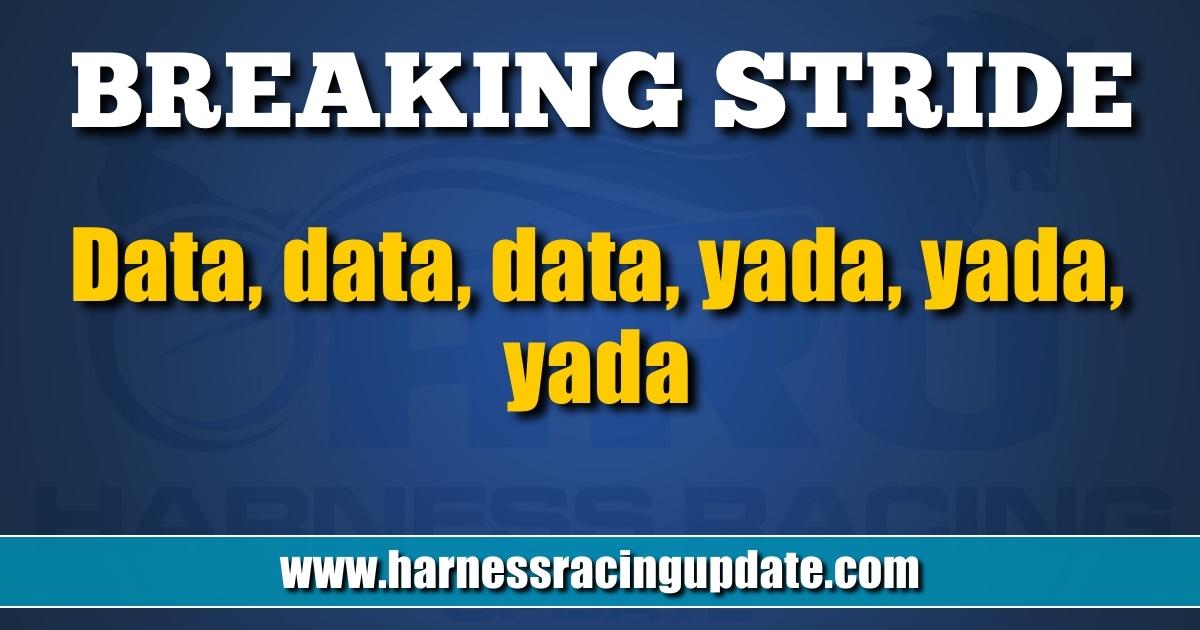
Data, data, data, yada, yada, yada
How data can transform the fan experience in sports stadiums.
by Trey Nosrac
Sitting in my cluttered condo, Chez Trey, I fished out the remote hiding under my sweatshirt on the coffee table and pushed mute on the talking heads from the World Series preview show.
I nodded at the muted interview and asked Tom, my pal from the tech world, “Do you ever think my sport will be on a bigger stage?”
He took a sip of his Miller Lite, scratched his salt and pepper beard stubble, and said, “Once upon a time, racing horses was about head and heart. That is less true today and will be less true in the future. Another crucial element, data, is impacting your game. Data is good and bad, yin and yang, friend and foe. Data can enhance horse racing. But it can also doom racing.”
I chuckled. “That’s what I like about you. I ask a yes or no question and get a proclamation from the ghost of Steve Jobs.”
“It’s complicated. Young people face tidal waves of entertainment options. Racing needs a new playbook. You cannot continue to put out the same product and thrive. You need to offer immersive relationships and experiences based on data, or you will never find new participants, or, to put it bluntly, new money.”
“Dude, I can do nothing about the fractured sport of harness racing, and, as you know, doing nothing is my forte, my wheelhouse, and my specialty.”
He smiled. “Harness horse racing is like yacht racing regarding data. There is plenty available, but when engaging new fans, the opportunities are limited. Other sports have an edge in transitioning to new audiences. Everyone has tossed a baseball, so they have a baseline transitioning to a data world. Few have jumped into a sulky or opened a wagering account at a young age.”
Nodding, I said, “And horse racing is from a bygone era. The sport’s pulse beats on with old timers who found the sport and hung on for dear life. Their friendships in the game keep them alive. I have always believed people in harness racing were tough as old boots. The workers never seem to have time to be sick, and the gamblers face a new challenge with every racing program and still play despite the odds.”
“I agree,” he said. “Participants in horse racing are relics, but, in some ways, they are lucky. They found their passion and hung on. Today, old and young people live and die behind a computer screen.”
I nodded. “That’s nostalgia. It isn’t gonna stop the slide or add new people.”
He paused and said, “Your sport needs to get more data in new forms, and horse racing gamblers need to be more active and less passive.”
“Mumbo jumbo, not a plan, not actionable. Give me something specific.”
“Well, let’s see, this is yearling sales time, with thousands of horses going to auction.”
“Yes.”
“What about a computer ranking for each yearling in a sale? Sort of along the lines of the power ratings on racetrack gambling programs. Use unbiased computer programs and artificial intelligence, inhale every scrap of data on the genetic and physical sides, then spit out the numbers, giving each yearling a numerical valuation.”
“Cold hard numbers ranking yearlings in a sale?”
“That certainly doesn’t mean the programs identify the best yearlings, but having a set of rankings available gives customers a baseline. Simply having a baseline gives the people something to argue for or against, which is useful on several levels.”
“This computer stuff never seems to pan out in horse racing.”
“Not yet, but digital fires spark to life with every passing day. People appear to enjoy diving into numbers. Participants feel like they are digging and finding nuggets that others miss. That’s why the sports drafts are so addictive. Plus, today’s technology is simpler to access and much more immersive than it was ten years ago when early attempts in racing tried to create audiences from data.”
“What if the data shows that wagering on a horserace is a crappy idea? Then all your data works against us.”
“Trey, that is a great point. Data will find your sport. I’m sure it already has in many instances. The key is to make the gamble favorable; your sport will be in the water with serious players, but one advantage you might have is wagering on animals. Animals make you different than the others in the pool.”
“Growth from data feels like a big ask.”
He nodded at the baseball interview on my TV screen. “Ten, fifteen years ago, there were baseball statistic nerds, but only handfuls. Today, everyone seems to be a baseball nerd analyzing launch angles, spin rates, WAR ratings, salary comparisons, and crazy minutia. More than ever, fans enjoy mining data for analysis. The betting line on a ballgame wager can change with each pitch. It’s fun. But wait until they can easily gamble on the baseball games. The interest in hardcore oceans of data will explode.”
I clicked the unmute and heard a talking head say, “The defending champions have a 61.75 per cent chance of repeating, but those chances go down to 58.37 if DelGatos’ tenon flexor doesn’t allow him to pitch in game three. The next batter is Manny Mullins, his chances of reaching first base on this at bat are 31.6 per cent, and his odds of swinging at the first pitch are 27.1 per cent.”
I sighed and said, “So, you are saying racing should lean into the data?”
“Big time, in every way possible. I believe data would prove this theory.”












